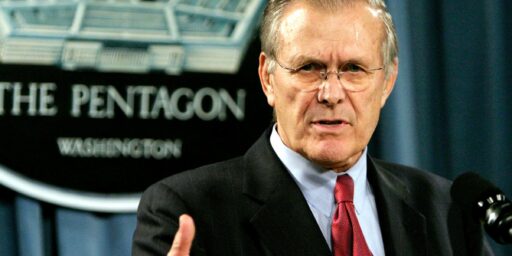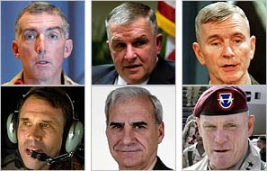Iraqi Democracy in Trouble?
Several in the blogosphere are seizing on a quote at the end of a very long story in today’s NYT about escalating violence in Iraq:
“Senior administration officials have acknowledged to me that they are considering alternatives other than democracy,” said one military affairs expert who received an Iraq briefing at the White House last month and agreed to speak only on condition of anonymity.
That somebody in the administration is “considering alternatives” to any given preferred outcome is to be expected. Indeed, they’d be rightly excoriated for “lack of planning” if they weren’t doing some worst-case brainstorming. Could the sectarian violence in Iraq topple the fragile elected government? Sadly, yes. Could Iraq splinter into three or more sectarian mini-states? Indeed, it could.
Andrew Sullivan, however, takes a break from speculating that the foiled British hijacking plot was markedly less dramatic than first advertised to muse as to whether Cheney and Rumsfeld ever really wanted democracy in Iraq at all.
One subversive theory – which I’m not endorsing, just airing – is that both merely wanted to turn the Saddam regime to rubble, and then play along with neocon democracy supporters, while making sure that the military was never given enough resources to do nation-building. Then Cheney and Rumsfeld could prove their point about the impossibility of reforming the Muslim world, and promote the view that we need merely to pummel enemies, project military fear across the region, and deter Islamo-fascism by “shock and awe.” The Likud strategy, in other words.
Airing without endorsing is an unusual stance for a man who has spent the last two decades or so putting his views on paper to take. After more idle gossiping, Sully concludes,
This theory is probably too complex and subtle to be true. The screw-up theory of history is more often the most plausible. But it does make some internal sense – if you assume that Cheney and Rumsfeld are not complete incompetents.
So, he not only does not endorse the theory–he’s just sayin’ is all–but he thinks it “probably” untrue. Yet, his last thought is that it’s perfectly plausible. Hmmmmm.
UPDATE: AllahPundit observes, “Ana Marie Cox is now the only one of Time’s holy trinity of bloggers who hasn’t floated a bat—- conspiracy theory on the magazine’s website. And she’s ‘the dumb one.'” Ouch.





…all to promote oil profits and the future success of Haliburton and Co…
Mmmmwah ha ha ha ha (maniacal laughter).
(Darth Vader voice) Soon, my plan will be complete…
(Emperor) And then they will experience the firepower of this fully-armed and operational battle-blog!
I’ve never agreed with much Sully has written in the past, but lately he’s been starting to sound downright unhinged.
I take Andrew’s back-handed compliment to mean that if Cheney and Rumsfeld can be construed as being competent at anything it is only in accomplishing wicked ends, but, of course, Andrew knows that they can’t even do that right.
Oh come on! We shouldn’t put ANY stock in what an anonymous source says in the liberalest of the liberal newspapers.
This quote was surely fabricated or said by someone who doesn’t know what they are talking about.
Bush said yesterday that “If we leave [Iraq] before the mission is complete, if we withdraw, the enemy will follow us home.”
It is clear that he recognizes the fact that if we leave Iraq, both the Shiite militias and Sunni extremists will put on hold their domestic internecine battles to come to the US and try and terrorize us.
If we don’t make sure the current government holds sway, the outcome will be Muqtada al -Sadr’s Madhi Army moving from Sadr City to our shores in their perennial battle against freedom.
The issue here is that Iraq is the front line in the war on terrorism. If we take the Defeat-ocrat strategy we will suffer immensely.
Read real clear politics named source post about the NYT article. Both NYT and RCP have a known bias. One is using anonymous sources to bolster their bias and the other is using named sources. The NYT doesn’t bother including any of the named sources.
Trest,
I can’t for the life of me tell if you are being sarcastic or not.
The commenters here are extremely disappointing. Lets be serious folks.
We probably all agree that security is the prerequisite for all else in Iraq. It also seems pretty clear that the current democracy in Iraq is unable to provide security, and seems barely able to insure its own survival. The notion that serious people (especially of the conservative persuasion) may feel that a strong government clamping down on the chaos is a more pressing priority than a democracy (especially since the democratic spirit tends to unleash centrifugal forces) is not absurd.
Rumsfeld has never had the same agenda is the most hard-core neocons. He clearly has been driven by his vision of a transformed military – lean, agile, light, more like a global swat team. The Wolfowitz axis, while not explicitly pushing nation-building, have always had a vision that obviously demanded something akin to that. The alliance of these forces in support of the Iraq war rested on the fantasy that the Iraq invasion would be a “cakewalk” – Rumsfeld could demonstrate the capabilities of his lean military, then we would get out, and the Chalabi-types would be carried on the shoulders of the people to the presidential palace where they could institute the new democratic regime.
I think it fair to say that Rumsfeld would never go for nation-building, even if it became clearly necessary (he has resisted to this day, ANY increase in troop levels). It would be one thing if he simply acknowledge the falsity of the war premises, and agreed to the nation-building agenda. That would demonstrate that his highest priority was democritization. If you cant do it lean, then do it heavy. But that hasnt been the case. When reality struck, he stuck with his vision of a lean force, even at the expense of the political situation there. In short, it seems quite reasonable to conclude that he would see the chaos there as an example of how nation-building is a mistaken path. And he would prefer to let that lesson be absorbed, rather than to change his own mind and make the situation better.
If Bush and Cheney really wanted three or more way split, wouldn’t it have been simpler to have put that into the voting and have it happen that way. Then they could say, this is what the Iraqi’s wanted to happen, we are just following their wishes. The Kurds would most likely have jumped at such an idea. The Sunni’s could have been persuaded by saying that each part could decide if they wanted the US to remain or not. Earlier, they probably would have jumped at a way to easily get the US out. Now, I suspect they are seeing the value of the US presence. The Shias are the only one who would have stood to lose as they now are the dominate population in a larger country (instead of all of a smaller country).
Of course this would have made Turkey and Iran even more upset to see a free Kurdistan. And the Sunni’s would have quickly become a client state of Syria.
But given that there are so many people saying the reform of the Arab world is so impossible anyway, I can’t see setting it up to fail as being necessary.
True. But the first issue to address is whether _any_ form of gov’t can consolidate control & provide security while the US maintains such an overwhelming presence on the ground.
As for Cheney, Rummy, and everyone else’s hidden agendas, let me remind the assembled folk here that the administration’s #1 choice to have been running Iraq right now was that tool Chalabi. As bad as things are over there, I have no trouble believing things would be worse now if that hack was running things for us.
Besides, if anyone wanted peace in that region to fail loudly, they’d just have to make sure the Kurds really did establish their own independent state right where they are in northern Iraq. The Turks would invade within a week, and then the whole region would fall to open warfare within 6 months.
Iraqi Democracy in Trouble?
Whose isn’t?
I doubt the administration was ever that serious about democracy. The original plan was to turn the country over to Chalabi and have it run by an oligarchy. This was a decent plan except for the fact Chalabi was a corrupt douchebag and possible Iranian spy. The smart people in the administration must have known democracy would lead to an illiberal Shia government dominated by Iran. There was most likely a strategy for moving slowly from oligarchy to democracy but events on the ground caused the CPA to accelerate the entire process. A friendly oligarchy hostile to Iran looks pretty good at the moment.